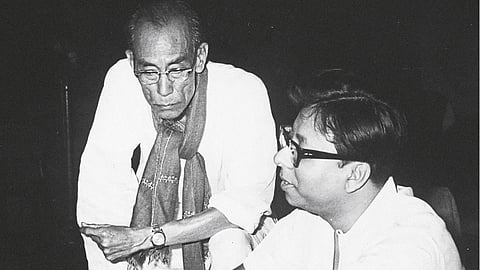
- HOMEGROWN WORLD
- #HGCREATORS
- #HGEXPLORE
- #HGVOICES
- #HGSHOP
- CAREERS
- ABOUT US
- CONTACT US

There are uncountable reasons why the name S. D. Burman towers over even some of the greatest Bollywood composers ever. Born Sachin Dev Burman in 1906, this scion of a Tripura royal family defied expectations, ditching the princely robes for a life draped in melody. Burman's story begins in Comilla, Bangladesh, where the lullabies of his folk-singing wet nurse and the classical training from his father, a trained sitarist, sparked a lifelong love affair with music. This early exposure to seemingly contrasting genres – the earthy beauty of folk and the structured elegance of classical – went on to become the cornerstone of his signature sound.
After he grew up and moved to Bombay in the 1940s — a transitory time in the Indian film industry, Burman refused to be swept away by the tide of formulaic compositions. He brought with him the soul of Bengal, weaving elements of Baul and Bhatiali folk traditions into his music. Imagine the surprise of audiences when the haunting melodies of Ami Je Tomar (Pyaasa, 1957) – a song steeped in Bengali folk – graced the silver screen. This wasn't just about borrowing; Burman skillfully interlaced these elements with the complexities of Indian classical ragas, creating a sound that was both familiar and refreshingly new.
But Burman wasn't a one-trick pony. He was a man with a restless ear, constantly seeking new avenues for musical expression. The influence of Western music began to gently seep into his compositions. The playful jazz scatting in Aaj Phir Jeene Ki Zid Hai (Guide, 1965) or the gentle bossa nova sway of Tere Bina Zindagi Se (Anand, 1971) showcased his willingness to experiment and push boundaries.
This ability to blend genres was as technical as it was soulful. Burman understood that music spoke a universal language, transcending cultural barriers. His melodies resonated with audiences across India, creating a deep emotional connection. Songs like Lag Jaa Gale (Woh Kaun Thi? 1967), a heart-wrenching melody, and the joyous Kajra Mohabbat Wala (Kismat, 1964) showcased the emotional spectrum his music could evoke.
Burman's legacy extends far beyond his captivating melodies. He was a master collaborator who worked with some of the finest lyricists and singers of his time. His partnership with Majrooh Sultanpuri resulted in timeless classics like Shola Jo Bhadke (Guide), while his ability to mold melodies to individual voices, be it the powerful vocals of Lata Mangeshkar or the playful charm of Kishore Kumar, remains unmatched.
However, Burman, the moody genius’s journey wasn't without its share of controversies. The most famous was his fallout with the iconic singer Lata Mangeshkar and his preference for working with his son, R. D. Burman. Even while working with his son one day in the studio, he was so upset with the recording, that he walked out. Turns out, the song being recorded was none other than Dum Maaro Dum (Hare Rama Hare Krishna, 1971), a track that went on to become one of the most famous and evergreen Bollywood songs to ever exist. These spats, though unfortunate, don't diminish his brilliance or the legendary people involved.
Throughout his career, he was bestowed with prestigious awards, including the Sangeet Natak Akademi Award and the Padma Shri, a civilian honor for distinguished service. His music transcended generations and language barriers, leaving a lasting impact that continues to be celebrated. S. D. Burman passed beyond the veil in 1975, but his melodies continue to resonate with audiences; a testament to his enduring legacy.
If you want to delve deeper into the fascinating world of S. D. Burman, the meticulously researched biography S. D. Burman: The Prince Musician by Anirudha Bhattacharjee and Balaji Vittal is a must-read. It paints a vivid picture of the man who redefined Indian film music; a man who truly lived and breathed melody. The book S D Burman: The World of His Music by Khagesh Dev Burman is also a wonderful read that paints an intimate picture of the maestro.
I will end the article by asking you to listen to my favorite SD Burman track. It's surely not his most celebrated or technically gifted track but it brings out of me a sheer sense of unexplainable joy:
If you enjoyed reading this, here's more from Homegrown:
The Life & Times Of The Shehnai Maestro Who Revolutionized Indian Classical Music
Celebrating The Life & Legacy Of Ustad Rashid Khan: A Hindustani Classical Legend
Watch A Zakir Hussain Narrated Documentary Tracing The Legacy Of Indian Classical Music
